Are you confused by the hundreds of different online booking software solutions?
You may already know that 40% of travellers book online, and the online travel market in Australia is worth $515.7 million. Mobile bookings alone account for 18% of online revenues, and that figure was measured back in 2015…it certainly hasn’t slowed since then.
Internet travel booking revenue has grown by more than 73% over the past five years. There’s no question whether you need to take online bookings. That’s already a given.
So, you begin your search, only to be hit with hundreds of different options, quickly ruining any romantic ideas you had of a smooth transition to an online booking system for your tour operator website and a happily ever after.
Where do you even begin???
Don’t worry, we come bearing good news. Choosing the right online booking software system for your tour operator business doesn’t have to take 10 years off your life.
Follow our guide below and we’ll walk you through the questions you need to be asking, and the points you need to consider in this very blog post. When we’re done, you’ll be able to confidently choose the best online booking software for your business. Grab your coffee, and let’s dive in.
What to look for in Tour Operator Online Booking software?
1. Brainstorm with your team
Ok, before you get started with any research, it’s interview time. And who knows better about your needs than your team. Talk to every key area of your business – admin, finance, marketing, operations, and sales. Ask them what requirements they have, and what’s currently not being met.
Align your list with organisational goals, so you have a thorough understanding of what your company needs (and wants) in tour operator software. This first step is to help give you a foundation for your research, so you’re not just flying blind.
2. Sort your wants & needs
Do it the old school way and write down a big list of all the things that you need. Sort them into must-haves and nice-to-haves. This action is designed to help you understand the difference between what your company ‘needs’ and ‘wants. Knowing this will help with your buying decision.
Get your team together to do this. Book a meeting room and spend a couple of hours putting pen to paper (or marker to whiteboard).
Here are some of the differences between basic and complex software systems. You can see why having a list to refer back to will save a lot of headaches.
Basic requirements:
- Web-based (in the ‘cloud’)
- Real-time booking
- Payment options (PayPal, credit card, bank transfer, deferred payment processing, cash)
- An inventory system
- A user-friendly interface
- Customer support
- Integrations with Email marketing software
Complex requirements:
- Email customisation
- Currency and language settings.
- SMS and email automation
- Integration with 3rd party software such as CRM
- Detailed sales reports
- Resource management
- Voucher and promo code management
- Distribution channel management.
Some questions you might want to consider:
Do you want to accept payments online?
This is a big one, of course. There’s little point having a booking system without online payment functionality. This allows customers to make the booking themselves, and reduces the drain on administrative resources.
Do you need the software integrate into my website?
With just about anything online, the user experience is your main focus. It can, literally, be the difference between a sale and great leads leaking to your competitors. Can it be integrated into your website, and at what cost? Check that it has an API or a way to integrate into your website so website visitors can make bookings in real-time. We recommend that you don’t send people to a separate website during the booking process. It reduces trust, and doesn’t provide a consistent user experience, resulting in less sales.
What about my other 3rd party tools?
Don’t forget about all the other tools you use to streamline business operations – mobile apps, accounting software, email marketing, and so on. It can save considerable admin time if these tools all talk to each other without manual interference. Check for existing integrations with all of these tools.
And, what about my data?
If you choose a standard booking platform, this question will most likely be on your mind: ‘Who owns my data?’ This is probably the most important question to answer. You don’t want to be dealing with the loss of data due to fine print you’ve missed. Make sure you’re 100% certain you own your data, no matter what software system you choose for your tour company.
It’s a good idea to start mapping out what features you’d like your booking system to include, before spending a dollar. Pull out a pen and a big sheet of paper, and just write it out, the old-fashioned way. Write all your thoughts down. Visualise what you want your software to look like, work like, and function like.
3. Match to your company’s goals
Cool, so your team has given you their two cents and you’ve got your list of ‘needs’ and ‘wants.’ It’s time to add your company’s goals to this mapping exercise. This part will further draw the line between the must-haves and nice-to-haves. You might think having a particular feature is important, but if it doesn’t align with your corporate goals, it’s not worth the extra investment. Focus on what’s important for your business.
4. What’s your budget?
Although you shouldn’t base your decision on the software cost, it will help narrow your choice. There’s no point falling in love with a system if it doesn’t fit your budget. If you do go the standard option, consider the price of the commissions and fees. This will affect your bottom line and profit margins sale.
Get ready to start your research.
Your core options for online booking software
The good thing about tour operator software is you have options. The difficult thing about tour software is you have options… Here are five of the most popular options for tour operators.
Cloud-based 3rd party software (recommended)
One of the main reasons why businesses love cloud systems is its accessibility. You can log into your software from anywhere, at any time. Your customers can book their tour on your website and pay for it. This solution is cost-effective, and you don’t have to worry about storage. Cloud storage solutions are intuitive, flexible, and easy to integrate. But there are downsides too, like ownership.
Pros: Access bookings anywhere, anytime. This option is typically quite intuitive with other systems.
Cons: You’re not the software/data owner. It may not have the flexibility to match all your needs. Ongoing fees & commissions can add up (you can calculate how much your 3rd party booking software will really cost you here).
Custom-built online booking system (recommended)
If you’ve researched or tried your luck with other booking systems with no success, it could be time to look at building your own custom online booking software. While building custom software requires a decent upfront investment, it will be built to perfectly fit your needs, improving efficiency and effectiveness. If you take a high volume of bookings, considerable cost can actually be saved over time on commission which a lot of the 3rd party online booking systems take.
The most effective way to do this is to partner with a website development firm that understands the software needs of a tour operator. It’s critical that the agency fully understands your business and how it operates, so it doesn’t interrupt other systems. An investment of time upfront to scope the project out is extremely important. Built by the right team, nothing can beat a customised system to manage your tour bookings.
Pros: It’s 100% designed for your needs (no having to change your processes to suit). There’s no ongoing sales commissions & monthly fees.
Cons: Requires a decent upfront investment
Keep it old school
Think about the number of tools you currently use. Combine all of them together – your calendar, spreadsheets and emails – and you’ve got a booking system. Heck, it might be a clunky system, but it’s a system. It’s cheap and easy to manage with a small number of bookings to manage. But you’ll soon start to push its limits as you grow.
Pros: It’s free/cheap & easy to learn.
Cons: There’s no scalability. It’s only a good-for-now option. It’s clunky, and inefficient. No automation, so very manual.
Open source booking software (not recommended)
You can download free open source booking software. But like all things, you get what you pay for. If you do, however, have the knowledge and skills in-house to resolve any IT issues with the system, you might be able to manage the system just fine. Always be wary of the limitations and understand when it’s time to move on and invest in a professional solution.
Pros: There’s no initial financial outlay required
Cons: Just like the DIY option, you’ll soon hit a roadblock. There’s minimal customer support because, well, you’re not paying for anything.
Install a system on your desktop (not recommended)
Booking systems can be installed on your computer, too. While many companies use this option, it is becoming an outdated method. Why? Because you can only access the data from that one computer. This means, one person is responsible for your entire company’s bookings. It also means you have to take manual backups.
Cons: You can’t access the bookings remotely. No online payment. This can affect customer communication and satisfaction.
Research the 3rd party booking software options
So you’ve probably guessed that we’re proponents of both the Cloud-based 3rd party software and for more complex needs, or in the case of high volume sales a custom online booking system, depending on your needs.
So the next step is to take your list of must-haves and nice-to-haves and start researching your 3rd party options.
It’s important that you remain realistic about what your software provider can and can’t do. Look at each option objectively and match your preliminary needs with the features that each software provider offers.
Run some google searches such as “online tour operator booking software” and write down all the booking systems that include all the features that are in your must-have list. Then underneath each, record:
- the features from your nice-to-have list that they meet pricing
- any other notes about why you like/dislike it
Now compare each one in the list that are within or close to your budget and narrow down to 2 or 3 that you want to explore further.
Once you have these you should request a demo, or start a free trial to go through the software and get a real feel for how the system works. Remember, that there’s always a learning curve with a new system, but during the testing period keep an eye out for red flags like
- slow/bad customer support
- clunky, overly-complex user experience
- Missing features
If it turns out your needs are a bit more complex and no 3rd party options suit you, or that you’re going to have to pay commission on every sale which is going to add up to a significant expense each year, it’s time consider a custom online booking system, built specifically for your needs. If that’s the case get in touch with us to start a conversation and see whether we can help you.
Final thoughts
Ahhh, take a deep breath – we’re finished. Choosing the best tour operator booking software takes time, so while there are ways of streamlining this process, you can’t take shortcuts or it will hurt you in the long run when you figure out it was a poor fit. What’s good for your company might not be best for your competitor. So, forget what others are doing and focus on your own business goals and what fits the processes in your business.
Know the costs involved, decide which features you want, assess the software vendor (find what you like and don’t like), and make the decision, which option best suits your needs and provides the best user experience for your customers.
We specialise in integrating 3rd party online booking systems into websites, as well as building custom online booking software – matched perfectly to your needs. If you’re considering either option you can request a consultation for an obligation-free chat and we can help you decide which way is right for you.









Thanks for sharing valuable content. This will surely help lots for travel agency to select the best software in the booming industry